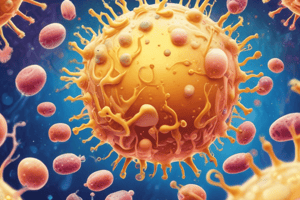Podcast
Questions and Answers
What is a significant virulence factor of Pseudomonas aeruginosa that aids in its adherence to cell surfaces?
What is a significant virulence factor of Pseudomonas aeruginosa that aids in its adherence to cell surfaces?
- Flagella
- Exotoxins
- Pili (correct)
- LPS
Which condition makes infections with Pseudomonas aeruginosa particularly worse due to its impact on the immune system?
Which condition makes infections with Pseudomonas aeruginosa particularly worse due to its impact on the immune system?
- Neutropenia (correct)
- Skin integrity
- Intact immune system
- Mucociliary clearance
What type of infections has Pseudomonas aeruginosa been identified as a common cause of in healthcare settings?
What type of infections has Pseudomonas aeruginosa been identified as a common cause of in healthcare settings?
- Viral infections
- Foodborne illnesses
- Hospital-acquired infections (correct)
- Skin infections
What protective structure do biofilms provide to Pseudomonas aeruginosa?
What protective structure do biofilms provide to Pseudomonas aeruginosa?
Which of the following environments is Pseudomonas aeruginosa commonly found in?
Which of the following environments is Pseudomonas aeruginosa commonly found in?
What complication can result from the lipopolysaccharide (LPS) component of Pseudomonas aeruginosa?
What complication can result from the lipopolysaccharide (LPS) component of Pseudomonas aeruginosa?
What specific medical device provides direct access to the bloodstream, increasing the risk of Pseudomonas aeruginosa infection?
What specific medical device provides direct access to the bloodstream, increasing the risk of Pseudomonas aeruginosa infection?
Hot tub folliculitis, associated with Pseudomonas aeruginosa, manifests as:
Hot tub folliculitis, associated with Pseudomonas aeruginosa, manifests as:
What role do surface adhesins play in the virulence of Staphylococcus aureus?
What role do surface adhesins play in the virulence of Staphylococcus aureus?
Which toxin is associated with scalded skin syndrome caused by Staphylococcus aureus?
Which toxin is associated with scalded skin syndrome caused by Staphylococcus aureus?
What is a common clinical manifestation of an invasive Staphylococcus aureus infection?
What is a common clinical manifestation of an invasive Staphylococcus aureus infection?
How does Staphylococcus aureus typically evade the immune response?
How does Staphylococcus aureus typically evade the immune response?
What is the mechanism behind methicillin resistance in Staphylococcus aureus?
What is the mechanism behind methicillin resistance in Staphylococcus aureus?
Which of the following is NOT a disease caused by Staphylococcus aureus toxins?
Which of the following is NOT a disease caused by Staphylococcus aureus toxins?
In patients with neutrophil defects, what is a common observed outcome of Staphylococcus aureus infections?
In patients with neutrophil defects, what is a common observed outcome of Staphylococcus aureus infections?
What factor contributed to the rise of MRSA as a dominant organism in hospitals?
What factor contributed to the rise of MRSA as a dominant organism in hospitals?
What type of bacteria is Staphylococcus aureus?
What type of bacteria is Staphylococcus aureus?
What is the common transmission route for Staphylococcus aureus?
What is the common transmission route for Staphylococcus aureus?
Which of the following infections is commonly caused by Staphylococcus aureus?
Which of the following infections is commonly caused by Staphylococcus aureus?
What percentage of people are estimated to carry Staphylococcus aureus in their anterior nares?
What percentage of people are estimated to carry Staphylococcus aureus in their anterior nares?
What is the main virulence factor of Staphylococcus aureus that enables it to spread through the bloodstream?
What is the main virulence factor of Staphylococcus aureus that enables it to spread through the bloodstream?
What type of infections are associated with Pseudomonas aeruginosa?
What type of infections are associated with Pseudomonas aeruginosa?
Which fungal pathogen is known to be associated with lung infections?
Which fungal pathogen is known to be associated with lung infections?
What is a significant risk factor for infections caused by Staphylococcus aureus?
What is a significant risk factor for infections caused by Staphylococcus aureus?
Which pathogen is primarily associated with invasive skin infections and ventilator-associated pneumonia?
Which pathogen is primarily associated with invasive skin infections and ventilator-associated pneumonia?
What is a key characteristic of Cryptococcus neoformans that aids in its virulence?
What is a key characteristic of Cryptococcus neoformans that aids in its virulence?
What mechanism contributes to antibiotic resistance in common pathogens like Pseudomonas aeruginosa?
What mechanism contributes to antibiotic resistance in common pathogens like Pseudomonas aeruginosa?
Which setting is commonly associated with infections caused by Cryptococcus neoformans?
Which setting is commonly associated with infections caused by Cryptococcus neoformans?
Which of the following conditions is often linked to Pseudomonas aeruginosa infections?
Which of the following conditions is often linked to Pseudomonas aeruginosa infections?
What is the primary mode of transmission for Cryptococcus neoformans?
What is the primary mode of transmission for Cryptococcus neoformans?
Which of the following conditions best describes the survival capability of Cryptococcus neoformans within the immune system?
Which of the following conditions best describes the survival capability of Cryptococcus neoformans within the immune system?
Which of the following diseases is associated with inhalation of Cryptococcus neoformans?
Which of the following diseases is associated with inhalation of Cryptococcus neoformans?
What type of infection is commonly associated with low white blood cell counts in patients, particularly after chemotherapy?
What type of infection is commonly associated with low white blood cell counts in patients, particularly after chemotherapy?
Which of the following mechanisms contributes to the antibiotic resistance of Pseudomonas aeruginosa?
Which of the following mechanisms contributes to the antibiotic resistance of Pseudomonas aeruginosa?
Which antibiotic is an antipseudomonal penicillin used for treating Pseudomonas aeruginosa infections?
Which antibiotic is an antipseudomonal penicillin used for treating Pseudomonas aeruginosa infections?
What best describes Pseudomonas aeruginosa?
What best describes Pseudomonas aeruginosa?
What is a major reason for the increasing rates of multidrug resistance (MDR) and extreme drug resistance (XDR) in Pseudomonas aeruginosa?
What is a major reason for the increasing rates of multidrug resistance (MDR) and extreme drug resistance (XDR) in Pseudomonas aeruginosa?
What type of infection is specifically linked to hot tubs?
What type of infection is specifically linked to hot tubs?
Which of the following is commonly a complication in patients with chronic lung infections, specifically cystic fibrosis?
Which of the following is commonly a complication in patients with chronic lung infections, specifically cystic fibrosis?
Flashcards are hidden until you start studying
Study Notes
Staphylococcus aureus
- Gram-positive cocci found in clusters
- Common in the anterior nares (30% of people carry it)
- Major bacterial pathogen causing 1 million infections and 20,000 deaths annually in the US.
- Transmitted through skin-to-skin contact
- Leads to skin and soft tissue infections, can spread to organs like heart valves, bones, and lungs.
- Increasing infections related to IV drug use.
- Virulence factors include surface adhesions, invasins, and toxins.
- Surface adhesions help the bacteria bind to fibrinogen and fibronectin.
- Invasins like leukocidin, hyaluronidase, and hemolysins aid in spreading the infection.
- Protein A inhibits phagocytosis.
- Biofilm formation allows the bacteria to resist host defenses and antibiotics.
- Toxins produced include TSST (toxic shock toxin), EFT (exfoliative toxin), and SE (staphylococcal enterotoxin).
- Immune response involves an acute suppurative response with recruitment of polymorphonuclear neutrophils (PMNs) and pus formation.
- Recurrent infections are seen in patients with neutrophil defects and in immunocompetent hosts.
- Clinical diseases include localized infections (skin and soft tissue infections, surgical site infections) and invasive infections (bacteremia, endocarditis, osteomyelitis, septic arthritis).
- Toxin-mediated diseases include toxic shock syndrome (TSS), scalded skin syndrome (SSS), and food poisoning.
- Antibiotic resistance is a challenge due to beta-lactamase production, methicillin resistance (MRSA), and the emergence of multi-drug resistant strains (MDRSA).
Pseudomonas aeruginosa
- Gram-negative aerobic bacillus that produces a green pigment.
- Common in the environment (water, soil, hospital sinks, showers).
- Not typically found in the skin or gut.
- Major cause of hospital-acquired infections (5th most common).
- Virulence factors include pili, flagella, LPS (lipopolysaccharide), exotoxins, and biofilms.
- Pili and flagella aid in adherence to cell surfaces and motility.
- LPS promotes cell activation and inflammatory response, potentially leading to septic shock.
- Biofilms provide protection from host defenses and antibiotics (especially in cystic fibrosis).
- Immune response relies on mechanical barriers (skin, mucus, cilia), but damage to these defenses leads to increased susceptibility.
- Clinical diseases include hot tub folliculitis, burn superinfection, catheter-associated urinary tract infection (CAUTI), bacteremia (especially in neutropenic patients), hospital-acquired pneumonia (HAP), ventilator-associated pneumonia (VAP), and chronic lung infections in cystic fibrosis.
- Antibiotic resistance is a significant issue, with resistance to various classes of antibiotics including extended-spectrum beta-lactamases (ESBLs), carbapenamases, efflux pumps, and aminoglycoside inactivating enzymes.
Cryptococcus neoformans
- Encapsulated yeast with a large polysaccharide capsule.
- Found in pigeon guano, rotting vegetation, and soil.
- Transmission occurs through inhalation.
- Dissemination through the bloodstream can lead to infections in various organs.
- Causes around 220,000 cases of cryptococcal meningitis and 180,000 deaths annually.
- Virulence factors include the polysaccharide capsule (inhibits phagocytosis) and melanin production (acts as an antioxidant).
- Capsule is essential for its ability to cause disease.
- Can survive intracellularly in phagocytic cells like alveolar macrophages.
- Shows tropism for the central nervous system, causing infections like meningitis and encephalitis.
Studying That Suits You
Use AI to generate personalized quizzes and flashcards to suit your learning preferences.





